by Rachel Pienta | Apr 23, 2021
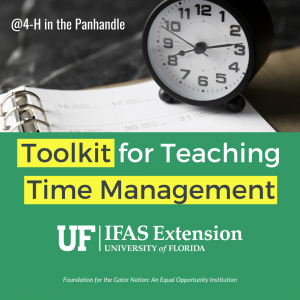 The “secret sauce” for successful 4-H clubs is often the not-so-secret time management skill of the club leader. Time management is a learned skill. This week’s blog post will explore strategies for time management. One important detail about time management – what works for one person may not work for everyone. Choosing time management strategies that suit the person increases the likelihood that these skills will become permanent, frequently used tools in a personal “toolbox.”
The “secret sauce” for successful 4-H clubs is often the not-so-secret time management skill of the club leader. Time management is a learned skill. This week’s blog post will explore strategies for time management. One important detail about time management – what works for one person may not work for everyone. Choosing time management strategies that suit the person increases the likelihood that these skills will become permanent, frequently used tools in a personal “toolbox.”
Teaching Time Management Skills
One strategy to learn a time management skill is to teach it. Both club members and volunteer leaders can benefit from learning and practicing time management skills. Youth and adults alike can begin with some basic elements of planning to start developing time management skills.
To complete a time management activity during a club meeting, the following items will be needed: a weekly schedule template, a Post It adhesive flipchart or a white board/chalkboard, pencils/pens, scratch paper for note taking.
Write the five elements of S.M.A.R.T goals on the flipchart or white board:
S – Specific
M – Measureable
A – Attainable (or actionable)
R – Relevant (or realistic)
T – Time-bound
During this activity, participants will learn about time management, scheduling, and goal setting. Begin the activity with a task. Ask adults and youth to consider and write out their schedule for an average week. Use a weekly schedule template so that everyone can use a visual organizer to describe their individual schedules. There are a number of free schedule templates online. One free option is available from Microsoft office: https://templates.office.com/en-us/schedules.
Once everyone has completed their schedule, ask each participant to write down a personal goal related to school or 4-H. Then, explain the S.M.A.R.T goal concept. Next, ask everyone to consider their goal within the S.M.A.R.T framework. Does their goal fit the five elements of a S. M.A.R.T goal? Why or why not? If their goal needs to be adjusted, what changes should be made?
After discussing several different goals, ask everyone when the time is scheduled to work on achieving this goal. Spoiler alert: very few of the participants will include anything related to the goal in the initial weekly schedule draft.
During the next phase of this activity, introduce one or more time management strategies from the blog resource list to the group. Engage participants in discussion about which strategies might be effective for them than others.
Setting Individual Member and Club Goals
Conclude the meeting by setting short and long term goals. What do members want to accomplish by the next club meeting? What goals do club members want to achieve for the year?  Time management is a skill that can be practiced and improved throughout the 4-H club year. Be sure to schedule in time to report on progress toward goals as part of 4-H club business meetings.
Time management is a skill that can be practiced and improved throughout the 4-H club year. Be sure to schedule in time to report on progress toward goals as part of 4-H club business meetings.
Resources
by Rachel Pienta | Feb 26, 2021
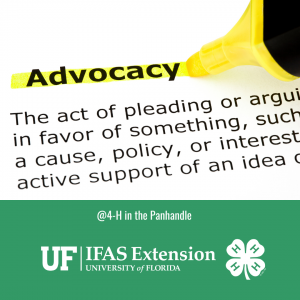 Citizenship, sometimes referred to as civic engagement, is a pillar of the 4-H program. A key part of guiding youth to develop as citizens is helping them to find and use their voice. One way to help youth in this discovery and skill building process is through learning advocacy. The simplest way to define advocacy is to think about it as being a process of defending or promoting a cause. When advocacy becomes linked with civic engagement, youth can become engaged in a powerful experiential learning process.
Citizenship, sometimes referred to as civic engagement, is a pillar of the 4-H program. A key part of guiding youth to develop as citizens is helping them to find and use their voice. One way to help youth in this discovery and skill building process is through learning advocacy. The simplest way to define advocacy is to think about it as being a process of defending or promoting a cause. When advocacy becomes linked with civic engagement, youth can become engaged in a powerful experiential learning process.
Advocacy Opportunities
4-H members have several opportunities to learn and apply advocacy skills in programs such as 4-H Day at the Capitol, 4-H Legislature, and the National 4-H Conference. However, advocacy can be an important part of the community club experience for all 4-H youth.
In 4-H, youth have opportunities to learn communication and leadership skills that can help them to become effective advocates for themselves and others. A community service project may involve an advocacy component. For example, youth in one county participated in a community clean up effort. The youth were assigned to clean a small park. While they were cleaning the park, they noticed that trash containers were not located in visible locations.
After the clean up project, youth discussed the park conditions at their next club meeting. The youth started discussing ways to improve the park and to help discourage littering. Their club leader introduced the SMART goals planning process to the club. The officers led the club members through the SMART process to develop a plan.
Putting SMART Goals to Work
Through the SMART planning process, the club took several important advocacy steps:
- Identified and researched an issue,
- Engaged in goal setting and planning,
- Reached out to decisionmakers,
- Presented information including possible solutions.
As a result of their experience, 4-H members learned how to address a community issue, ways to engage key decisionmakers, and saw their actions make an impact when county officials added trash containers in visible locations along with public signage.
Advocacy Learning Opportunities
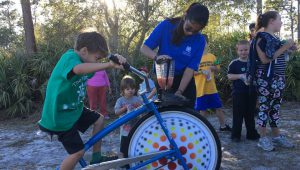
4-H Virtual 5K advocates for making small changes for a more healthy lifestyle
Opportunities to have youth engage in hands on advocacy experiences may involve community problem-solving. Youth can also learn advocacy skills by working to raise awareness about issues. For example, February is American Heart Month. Youth can engage in advocacy about heart health in several ways:
- Wear red and encourage others to wear red to raise awareness about heart health.
- Set exercise goals such as a walking goal to help improve heart health and challenge others to join your effort.
- Promote heart healthy nutrition by asking local restaurants to feature a special healthy menu item during February.
- Ask the county commission or city council to issue a proclamation for American Heart Month.
American Heart Month is just one example of healthy living focused advocacy. Each month of the year has several associated health awareness campaigns. By choosing to advocate for better health, 4-H members can address two pillars at the same time: advocacy and healthy living. You can also tie this campaign into our 4-H Virtual 5K, which occurs every March and encourages youth and adults to walk or run.
Celebrate 4-H and Practice Advocacy Skills
National 4-H Week is celebrated every October and offers a great way for youth to develop advocacy skills by raising awareness about 4-H. Ideas may include but are not limited to writing letters to the local paper, securing a prominent spot to set up a 4-H exhibit, requesting a proclamation from local government officials, or engaging in a community service project.
Tips for a successful advocacy learning experience:
- Start planning early.
- Use SMART goal planning process.
- Remember to celebrate success and say thank you.
For more information about 4-H programs and additional advocacy resources, contact your local UF/IFAS Extension office.
Resources
4-H Project Learning
https://edis.ifas.ufl.edu/pdffiles/4H/4H34300.pdf
National Awareness Months
https://www.medicalnewstoday.com/articles/health-awareness-months#march
Strategies for Engaging and Communicating with Elected Officials
https://edis.ifas.ufl.edu/wc324
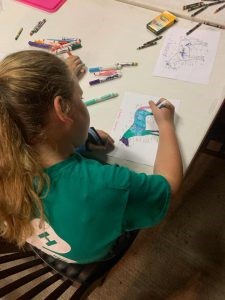
by Rachel Pienta | Jul 17, 2020
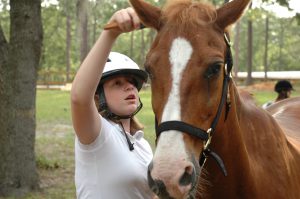
Youth grooming a horse. UF/IFAS Photo: Sally Lanigan.
Across Florida, 4-H clubs have adopted creative ways to stay connected while social distancing
practices are in place. The Wakulla 4-H Bits and Bridles Horse Club, like other 4-H clubs across Florida, ceased in-person activities in mid-March. During the regular program year, the Wakulla 4-H Bits and Bridles Club met monthly for a club meeting that included activities focused on equine science, leadership development, and hands-on skill building. While horseback riding was not a part of every club meeting, most club meetings included some sort of hands-on activity with horses. Club leaders who already had an active Facebook group for their club families, considered how to stay engaged in the face of a prolonged pause in hands-on, face-to-face meetings.
Staying Connected
In Wakulla, the 4-H Bits and Bridles Horse Club has established a welcoming, inclusive environment for both youth with and without horses of their own. After the pause on in-person programming went into effect, Bits and Bridles volunteer leader, Julie Dennis, communicated with youth members and their families via email, sending the following message: “Given the current need to promote safety in our community, we’ll be taking a pause from in-person Bits and Bridles Meetings. Don’t worry though, as soon we can, we’ll get back to our monthly meetings. In the meantime, let’s use our Facebook group as a way to stay connected!”
Julie’s communication was followed by a series of video and photo sharing by adult volunteers and youth members in the private Facebook group for the club, including a challenge to demonstrate a horse-related skill with or without a horse at home. Youth were asked to post, with parent permission or assistance, at least one thing to the Facebook group that they were doing while at home to learn more about horses. The instructions urged youth to post a picture or video engaged in an activity to learn more about horses.
Group members responded by sharing videos demonstrating how to practice several skills with items they had at home: roping livestock and how to use different types of tack. Other youth shared videos demonstrating how to properly care for horse hooves and how to groom a horse. Several youth demonstrated riding activities.
Four Ideas to Stay Engaged with 4-H at Home
Activity ideas were provided to parents to share with youth members. The ideas below were collected by club leader, Julie Dennis, and reviewed by 4-H Agent, Rachel Pienta. Each activity is shared below using language close to or similar to what was shared with 4-H families via email.
Learn a new drill or pattern.
If you have a horse, work on riding in a circle and just the same steps every time at a walk, trot and then collected lope. Dirt lots make a great place to do this because you can retrace your steps and see where your horse has been. Once you master this exercise, work on a serpentine or start by making a small circle and then gradually get bigger. For ideas, get your parents to help you use Pinterest and type in “Horse Drills.” The possibilities are endless. Get someone to take a video and share with us on Facebook!
If you don’t have a horse, you can participate too! Now is the time to get that barrel pattern down. This website has a great summary of the barrel pattern. You can also try your hand at the pole bending pattern. Find some objects at your house (rocks, chairs, whatever you can find outside) and set up these patterns. Then run them yourself & ask a parent to take video for you!
Learn how to clean your tack while practicing the parts of a saddle.
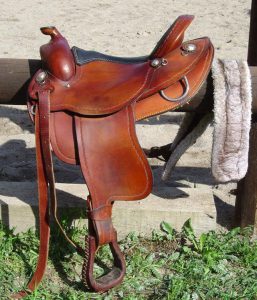
Dry leather can get cracked and brittle.
Spring cleaning! Break out your tack with some good saddle soap and get to cleaning. Remember, this is an important part of being safe when you ride. Dry leather can get cracked and brittle. Anyone who has been around horse shows long enough has seen what happens when an off billet strap breaks. You wind up in the dirt! Not only is this a safety hazard but it can cost you an otherwise very nice run. These are two very good reasons to make sure your tack stays clean.
If you don’t have a horse – there are still ways to learn! There are videos that you can learn from online. Ask a parent to help you search for videos on YouTube.
Start your 4-H Horse Project Record Book!
Now is the time to start on horse projects. A very popular and great project for all kids whether or not you own a horse, is to complete the 4-H Horse Project Record Book. This can be downloaded online. If you don’t have a horse, you can still participate. Make up your horse’s name and then research the information you’ll need to complete each section.
In the case of our club youth, members were encouraged to use online resources to research prices for supplies. Youth without a horse were offered a match with a 4-H Bits & Bridles mentor.
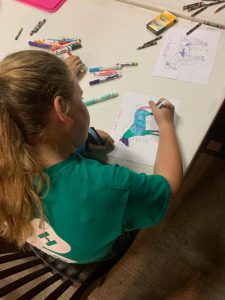
Youth coloring a horse diagram activity sheet.
Build Horse Curriculum into Homeschooling.
The National 4-H program has great curriculum available for all age ranges online. Try building in one horse lesson a week and then keeping a journal about what you’ve learned. This activity can be a great way to keep learning through the summer too!
For more information about 4-H clubs and activities in your community, or to volunteer with 4-H, please contact your local UF/ IFAS County Extension Office.
*“Please note the picture was taken prior to our challenges with Covid-19 and we encourage people to social distance and wear a mask for the personal safety of self and others.”
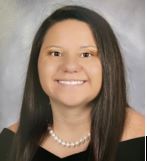
by Rachel Pienta | May 29, 2020
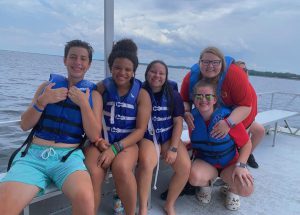
Leah with other counselors at Camp Timpoochee
Leah Lewis has been a devoted 4-H camper for the last ten years. She attended her first week of summer at the age of eight and was hooked. Leah counted the days and years until she could join the ranks of her heroes – the 4-H camp cabin counselors.
Since ninth grade, Leah has served as a camp counselor – leading a cabin of 4-H youth during a week or more of residential camp. Her service in this capacity has been exemplary. Leah’s accomplishment as a counselor earned her an invitation to serve in a leadership role for the annual Marine Camp. This invite-only opportunity is only given to the best of our 4-H camp counselors.
From 4-H Camp to County and State Leadership Opportunities
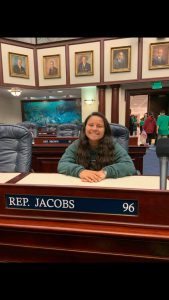
Leah in the FL House of Representatives chamber in Tallahassee
In eleventh grade, Leah took her 4-H involvement to another level when she became part of our Teen District Leadership Council. She served as president for the Wakulla 4-H Teen Leadership Club and led the club to apply for and complete a 4-H Pride Grant Project to do county clean up after Hurricane Michael.
During her senior year of high school, Leah also served on the 4-H State Executive Board. In this role, she planned the annual Legislative Day at the state capitol. Her efforts helped produced a successful 4-H Day at the Capitol experience for over 800 youth and their families from throughout Florida.
Leah had this to say about the impacts of 4-H on her personal development, “4-H has prepared me for what it’s like to be away from family and being independent for yourself. It’s taught me to think outside the box and allow me to grow as a person.”
Her favorite 4-H experience was attending the Southern Region Teen Leadership Conference. Leah said, “My favorite experience so far has been SRTLC. I enjoyed meeting all kinds of people in the south and I loved giving back to the community with our bag pack project.”
Reflecting on her time in 4-H, Leah’s message to other youth thinking about 4-H offered this advice, “I would tell them that 4-H is a safe place and a second home to anyone. They could learn many activities to help with everyday life and find lifelong friendships!”
Perspective from a Proud Parent
Leah’s mother, Angela, said being part of 4-H did wonderful things for her daughter, “Without a doubt, one of the best decisions I have made was allow Leah to be part of 4-H. The leadership, work ethic, responsibility and team building skills she has learned, will help her in her future endeavors. 4-H has given Leah the confidence and the ability to be able to meet more people and form many friendships. She has obtained important leadership skills and is now confident with public speaking and leading group projects. 4-H has instilled a great work ethic into Leah with projects that require time management, dedication, and hard work. Leah has been a camp counselor for the past 4 years and has worked as a gymnastics coach at IGG for the past 2 ½ years. Leah has really enjoyed being on many committees including 4-H Day at the Capital and CCS. Leah will truly miss being part of 4-H and going to summer camp when she starts college this fall.”
Wakulla County 4-H is proud of Leah Lewis. From organizing service projects to planning teen retreats for her peers, Leah has shown she has the capacity to lead others. Her work ethic has enabled her to hold a job, play sports, continue an active role in 4-H, and maintain her grades. We look forward to the many successes she will make in her future endeavors.
To find out more information about 4-H programs that can offer essential life skills such as independence, organizational skills, and goal setting, to your children or to volunteer with 4-H, please contact your local UF IFAS County Extension Office, or visit http://florida4h.org.
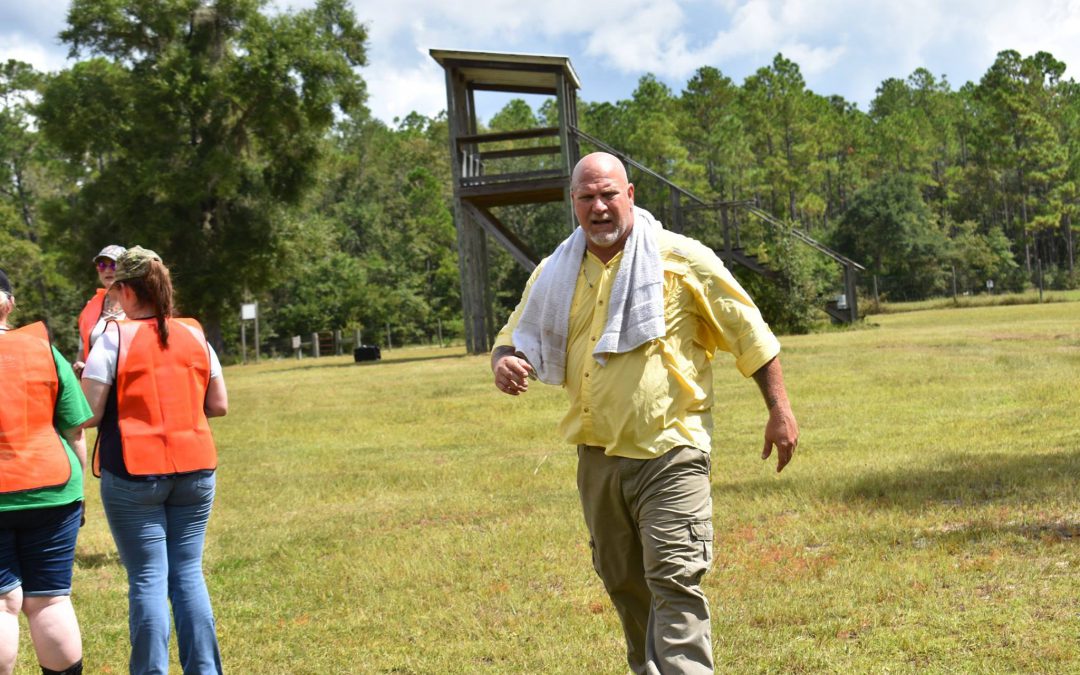
by Rachel Pienta | Apr 24, 2020
April is National Volunteer Month. Throughout the month of April, 4-H programs in counties across the Northwest UF/IFAS Extension District from Jefferson to Escambia counties take time to recognize volunteers and the contributions those volunteers make with their time and talent to youth development in their communities. Ken Gooding is a 4-H Shooting Sports Volunteer Leader in Wakulla County. Ken serves as President for the county’s 4-H shooting sports advisory group. He also provides organizational and content expertise for the program in a volunteer coordinator capacity.
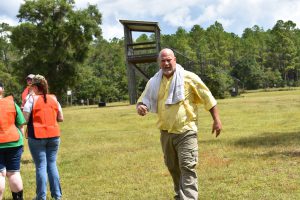
Ken Gooding volunteers on the range teaching archery and skeet shooting.
Ken co-founded the Wakulla 4-H Shooting Sports Club now known as “4-H Sharpshooters” in 2018. Since that time, the club has grown to include over forty youth members who learn archery and skeet shooting and ten adult volunteers who support club activities. In his volunteer role with Shooting Sports, Ken leads adult volunteers and develops youth leaders.
Leading Leaders of All Ages with 4-H
After he became a state certified Level One Shooting Sports Instructor in 2018, Ken continued his training at the national level. In 2019, Ken became nationally certified as a Level Two shooting sports archery instructor. This credential qualifies Ken to teach adult volunteers seeking Level One certification in archery.
For Ken, volunteering with 4-H is an expression of his passion for giving back to the community. Ken said, “I volunteer with 4-H because I believe I have a responsibility to share the skills I have with next generation and 4-H gives me the tools I need to effectively pass on this skill to a wide variety of youth in my community that would not otherwise have the opportunity that 4-H provides.
Giving Back to the Community
4-H volunteers help UF/IFAS Extension to amplify their reach into the community. Volunteers are said to be the civic heart of most communities. Ken shared his perspective on why he believes it is important to volunteer in the community:
“To actually be a member of a community, a person must have a vested interest in the success of the community. In the past, that interest was expressed in the general desire to see the community as a whole grow and flourish. Each member brought a particular skillset that when joined with others enabled the community to flourish. But each member also felt a duty or responsibility was owed to the community they helped to build, the community that provided for their individual success and prosperity. This is where 4-H, only one small opportunity for our community members can give back, comes in. Every one of our neighbors has a skill or a passion that they are uniquely qualified to impart to the youth of our community and 4-H has the tools each one of us needs to see that the lessons we’ve learned over a lifetime are not lost to time.”
Ken had a message to share about why he believes everyone should take time to volunteer. He noted the tremendous efforts often exhibited during times of emergency and shared that he often wonders what good things would happen if we all put a tenth of that energy into their community on a daily basis. In closing, Ken said that if he could make an ask of the community, he would ask that, “Each and every member of every community give a little bit of themselves back to their community. Think about, with that small commitment, what kinds of changes for the better could be achieved. I’ll be willing to bet, you’ll receive a greater return for your efforts.”
When Ken is not busy with 4-H, he works as a barge captain on the Mississippi River and volunteers with the Wakulla County Sheriff’s Office at the Sheriff’s shooting range. He also raises rabbits and chickens with his wife, Trena. Ken also shares his talents as a professional deejay with 4-H. Whether he is teaching archery or making the party happen with music, Ken is a valued volunteer and an inspiring role model for aspiring leaders of all ages.
For more information about UF/IFAS Extension programs, follow this link to connect with your local office.
Resources
 The “secret sauce” for successful 4-H clubs is often the not-so-secret time management skill of the club leader. Time management is a learned skill. This week’s blog post will explore strategies for time management. One important detail about time management – what works for one person may not work for everyone. Choosing time management strategies that suit the person increases the likelihood that these skills will become permanent, frequently used tools in a personal “toolbox.”
The “secret sauce” for successful 4-H clubs is often the not-so-secret time management skill of the club leader. Time management is a learned skill. This week’s blog post will explore strategies for time management. One important detail about time management – what works for one person may not work for everyone. Choosing time management strategies that suit the person increases the likelihood that these skills will become permanent, frequently used tools in a personal “toolbox.” Time management is a skill that can be practiced and improved throughout the 4-H club year. Be sure to schedule in time to report on progress toward goals as part of 4-H club business meetings.
Time management is a skill that can be practiced and improved throughout the 4-H club year. Be sure to schedule in time to report on progress toward goals as part of 4-H club business meetings.










